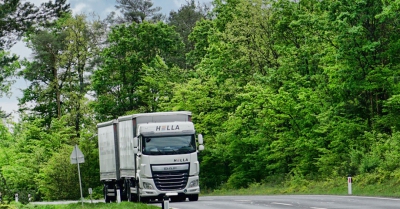Clean, hydrogen-powered heavy goods vehicles (HGVs) could become a reality on UK roads now that a regional bid has successfully attracted funding from the Department for Transport’s Zero Emission Road Freight programme.
The bid, known as ‘H2GVMids’, was developed by the Energy Research Accelerator, with support from EDF, the Midlands Engine, and Cenex.
Working alongside industry partners such as Arcola Energy, Toyota, Intelligent Energy and ITM Motive, the partnership will now prepare the ground for a green-hydrogen-fuelled 44-tonne truck demonstration programme in the Midlands.
With net zero transport a key component of the Ten Point Plan for Green Growth in the Midlands Engine, the H2GVMids project involves identifying all of the necessary infrastructure, including hydrogen refuelling stations, developing the business case and delivery system, and establishing a trial lease system for truck operators.
Other private sector partners involved in the project include Adelan, Horiba Mira, MDS Transmodal and the Tyseley Energy Park in Birmingham.
From the public sector, partners include Midlands Connect, Midlands Energy Hub, Nottingham City Council and the West Midlands Combined Authority, and academic support will be provided by the universities of Birmingham and Nottingham.
The funding awarded to EDF and partners has been delivered by Innovate UK on behalf of the Department of Transport, and is part of a wider programme of hydrogen transport demonstration projects in road and rail that have been launched by the government.
With 90% of the country’s people and businesses within four hours travel time, the Midlands is the focal point of the freight and logistics sector, accounting for 30% of HGV freight in the UK and hosting 35% of all warehouse space in the country, more than twice that of London, Scotland and Wales combined.
The strategic importance of the region to the logistics and transportation sector has been further underlined with the award of two regional Freeports at East Midlands Airport and Immingham Port.
Research and development in hydrogen technologies has a long history in the Midlands, and applications for the sustainable technology are already being rolled out in cities such as Birmingham which will soon commence operation of a fleet of hydrogen buses and open a publicly accessible hydrogen and electric vehicle refuelling station at Tyseley Energy Park.
The Midlands is also one of the most important locations for hydrogen innovation, leading the way with several nationally funded projects for large-scale hydrogen production.
These include the BEIS-funded £7.5m HyPER project led by Cranfield University and plans for a methane cracking pilot at Loughborough.
At Keele University, the HyDeploy project has pioneered hydrogen injection into the gas grid, while the University of Birmingham has already successfully trialled a new hydrogen powered train, and the University of Nottingham is developing hydrogen technologies for refrigeration in trucks.
In other areas of transport innovation, the Midlands is leading the UK with on-road test facilities for connected and autonomous vehicles, academic excellence and supporting services from Horiba Mira and Loughborough-based Cenex.
Chairman of the Midlands Engine, Sir John Peace, said:
Through initiatives such as this bid and our forthcoming Ten Point Green Growth Action Plan, the Midlands Engine pan regional partnership is making a significant contribution to UK net zero.
We have abundant strengths in green innovation, entrepreneurship and leadership that will be crucial to build on as our region and country seek to respond to the climate emergency, building back better, stronger and greener.
Rebecca Rosling, Head of R&D Smart Customers at EDF said:
Hydrogen is a key technology for decarbonising heavy duty transport and EDF is delighted to have joined with partners from across the Midlands to deliver this exciting project. As EDF’s coal generation stations in the region reach the ends of their lives, we are excited to work to develop the zero carbon technologies of the future in the region.
Steve Carroll, Head of Transport at Cenex, said:
With the Midlands at the heart of the logistics sector in the UK it feels fitting that a bid to decarbonise our transport network for heavy goods should come from our region.
The range offered by hydrogen makes it potentially the ideal fuel for HGVs. When generated from green electricity and used via Fuel Cell technologies hydrogen will deliver quiet, clean and low carbon transport for road freight.
Professor Martin Freer, Director of the Energy Research Accelerator (ERA) said:
Decarbonising heavy transport will play a significant part in the UK’s path to net zero and the Midlands is an ideal testbed for such technology.
This is an extraordinarily exciting and important opportunity. It provides the foundations for the Midlands to accelerate its ambitions for hydrogen-based transportation, and to take a leading role as the heart of UK road and rail transportation.
Alistair Barnes, Innovation Lead for Zero Emission Vehicles at Innovate UK which is funding the project, added:
Decarbonising Heavy Goods Vehicles is a significant challenge, and this project will take an important step towards demonstrating the technology at scale on UK roads. Innovate UK is proud to be partnering with the Department for Transport to deliver this initiative.
Richard Bradley, Head of Strategy at Midlands Connect, said:
The Midlands lies at the centre of the UK’s freight and logistics industries, and it’s fantastic that it’s been selected as the location for these future trials examining the use of hydrogen-powered HGV trucks.
The movement of goods has continued to grow across our region despite COVID-19, and action must be taken now to accelerate the roll out of alternative fuels such as hydrogen to make the industry greener, less polluting and more sustainable.
Midlands Connect is looking forward to working with other organisations across the project consortium by providing analysis to predict vehicle movements and the best locations for hydrogen refuelling stations.
For more information about the H2GV programme, please contact Faye McAnulla, Programme Director at the Energy Research Accelerator, email: faye.McAnulla@era.ac.uk.
For the latest on our region, subscribe to Midlands Matters, the official newsletter of the Midlands Engine.




